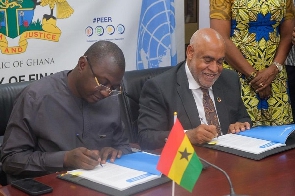 Dr. Mohammed Amin Adam and Charles Abani, UN Resident Coordinator in Ghana
Dr. Mohammed Amin Adam and Charles Abani, UN Resident Coordinator in Ghana
The United Nations (UN) has committed $517 million in grants to support Ghana to achieve its Sustainable Development Goals (SDGs), make the country resilient and accelerate economic transformation.
Dr Mohammed Amin Adam, Minister of State at the Finance Ministry signed for the Government of Ghana, while Mr Charles Abani, UN Resident Coordinator in Ghana, signed for his outfit.
According to the agreement, $270m out of the total amount, which covers 2023 to 2025, has been made available
The remaining $247m is expected to be mobilised through various approaches.
The UNSDCF would empower institutions and people, mainstream the concept of ‘leaving no one behind, and integrate various financing modules to accelerate Ghana’s attainment of the UN SDGs.
This move is to achieve an inclusive, resilient and sustainable economic growth and transformation; accessible, equitable, inclusive, sustainable quality basic social services; and durable peace and security in Ghana and the Sub-region.
Dr Adam reaffirmed Ghana’s commitment to ensuring the attainment of the SDGs through strategic partnership with the UN, noting that the economic transformation goal of the compact would support Ghana’s goal of becoming an export-led economy by leveraging on trade.
He expressed confidence that the UNSDCF implementation would augment the Government’s efforts to transform its education system and contribute to an equitable, sustainable, healthy and peaceful future.
“The relationship and cooperation between Ghana and the UN is critical to the well-being of our people. I am confident that with our concerted efforts, this cooperation framework agreement that we are about to sign will deliver the benefits it promises,” the Minister said.
Mr Abani said the compact had integrated challenges of leveraging financing to achieve the SDGs, climate and environment, digitalisation, urbanisation, data, and regional dynamics impacting migration and other human movements.
He noted that the successful implementation of the $517m agreement would help promote resilience, improve disaster preparedness and response and strengthen accountability in Ghana.
Mr Abani underscored that the cooperation framework would focus on both the UN’s programmatic contributions and a new way of working – reflecting a shift from siloed approaches to a more integrated approach of achieving the SDGs.
“The signing of the cooperation framework today, demonstrates the UN’s commitment to stand with Ghana on its forward-looking ambition to accelerate the achievement of the SDGs and the Agenda 2063,” he said.
He added: “The UN in Ghana stands in solidarity with you as the country strives to recover from the massive impact of COVID-19 pandemic, the triple planetary crisis (pollution, climate change and biodiversity loss) and the global crisis (including the war in Ukraine that triggered a global tri-dimensional threat to food, energy and finance.”